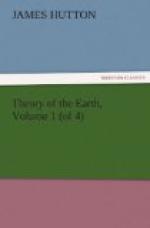I have thus endeavoured to put in its true light a species of reasoning, which, while it assumes the air and form of that inductive train of thought employed by men of science for the investigation of nature, is only fit to mislead the unwary, and, when closely examined, will appear to be inconsequential or unfounded. How mortifying then to find, that one may be employed almost a lifetime in generalising the phenomena of nature, or in gathering an infinity of evidence for the forming of a theory, and that the consequence of this shall only be to give offence, and to receive reproach from those who see not things in the same light!—While man has to learn, mankind must have different opinions. It is the prerogative of man to form opinions; these indeed are often, commonly I may say, erroneous; but they are commonly corrected, and it is thus that truth in general is made to appear.
I wrote a general Theory for the inspection of philosophers, who doubtless will point out its errors; but this requires the study of nature, which is not the work of a day; and, in this political age, the study of nature seems to be but little pursued by our philosophers. In the mean time, there are, on the one hand, sceptical philosophers, who think there is nothing certain in nature, because there is misconception in the mind of man; on the other hand, there are many credulous amateurs, who go to nature to be entertained as we go to see a pantomime: But there are also superficial reasoning men, who think themselves qualified to write on subjects on which they may have read in books,—subjects which they may have seen in cabinets, and which, perhaps, they have just learned to name; without truly knowing what they see, they think they know those regions of the earth which never can be seen; and they judge of the great operations of the mineral kingdom, from having kindled a fire, and looked into the bottom of a little crucible.
In the Theory of the Earth which was published, I was anxious to warn the reader against the notion that subterraneous heat and fusion could be compared with that which we induce by our chemical operations on mineral substances here upon the surface of the earth; yet, notwithstanding all the precaution I had taken, our author has bestowed four quarto pages in proving to me, that our fires have an effect upon mineral substances different from that of the subterraneous power which I would employ.




